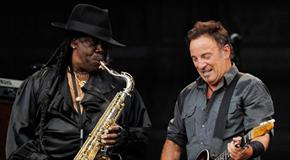Features
‘Big Man’ Clarence Clemons Recalled In NJ Haunt

Outside The Stone Pony, the legendary Jersey shore rock club where Clemons, Springsteen and other E Street band mates cut their musical teeth, Clemons loomed large as ever hours after his death Saturday from complications of a stroke.
“It’s a sad day for music and for Asbury Park,” said Caroline O’Toole, the club’s general manager. “He was huge here at the Jersey shore. He was ‘The Big Man,’ but he was an even bigger man here. His presence was just enormous and unbelievable. No one who has ever played at our club in all the decades was ever like him.”
The Stone Pony will open its doors at noon Sunday to let Clemons’ fans gather and reminisce about his storied career.
Within hours of his death, fans were slowly stopping by the club, which was hosting an unrelated act catering to a younger crowd Saturday night. Flowers, a candle and a handwritten sign saying “RIP Big Man” sprouted outside the building.
Phil Kuntz stopped to place a small yellow flower on a decorative white fence at the club entrance. Nearby, someone taped a handwritten sign that read simply “RIP Big Man.”
“I’ll never hear ‘Jungleland’ played live again, and that’s a bummer,” said Kuntz, 51, who had seen Clemons perform with Springsteen in excess of 200 times.
Brian Gay, 37, of Fair Haven, was watching a roller derby show at Convention Hall two blocks away when Clemons’ death was announced, and he, too, went to the Stone Pony to pay respects.
“You knew it was coming but it still hits you like a ton of bricks,” he said. “It just hurts. As a kid some of my earliest memories were of listening to his music. It feels right to be in Asbury Park tonight.”
John D’Esposito, a talent buyer for the concert promoter Live Nation, also stopped by The Stone Pony to honor The Big Man.
“Asbury Park is crying right now,” he said. “It’s like the whole city is one big teardrop. Our Pied Piper is gone.”

Kyle Brendle, the house promoter at the Stone Pony, said Springsteen and Clemons played routinely at the club in the 1970s -ut usually as unannounced acts.
“They never performed here as The E Street Band,” he said. “It was usually that they’d jump up on stage, unannounced, and rock out, ’cause they were here so often.”
The last time Clemons played the club was at a solo show in the summer of 2006, Brendle said. O’Toole laughed as she recalled having to find a masseuse for Clemons, who complained of an aching back that night.
“It was a Saturday night in the middle of the summer, and not exactly easy to come up with a masseuse on short notice,” she said, “So I called this woman I knew, who wasn’t a masseuse. I told her, ‘If he asks if you’re really a masseuse, just say yes.'”
O’Toole said Clemons, Springsteen and the E Street Band helped rebuild Asbury Park from a struggling, faded seaside resort in the early ’70s to a rebounding, hip culture center. His raucous sax solos helped define the Jersey shore sound of the ’70s and ’80s, a genre that also included Southside Johnny and the Asbury Jukes, and occasionally, a young Jon Bon Jovi.
“He played a huge part in making this city what it is today,” she said. “Losing part of our musical and personal history, well, it really, really hurts.”